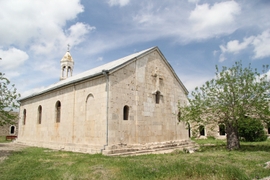An international technical conference dedicated to the great medieval poet of Azerbaijan, Nizami Ganjavi, was held in the Azerbaijani capital of Baku, within the 6th Global Baku Forum.
“Nizami Ganjavi is the Alexander the Great of the world literature. While Alexander the Great conquered the world with his might and power, Nizami Ganjavi did the same with his literary reputation, pen and artistic talent,” the Vice President of the Azerbaijan National Academy of Sciences, Isa Habibbeyli, said while addressing conference on the opening day.
More than 20 scientists from 13 countries and over 30 scientists from Azerbaijan attended the conference, titled “Interpretation of Nizami's Cultural Heritage in the Modern Period” from March 14-15. The event was co-organized by the Azerbaijani State Committee for Work with Diaspora, the Nizami Ganjavi International Center and Azerbaijan Comparative Literature Association.
The Turkish Prime Minister, Binali Yıldırım, stressed the need for a more extensive promotion of Ganjavi’s values during a panel session held within the forum on March 15. Nizami’s works have been translated into dozens of languages and have had a tremendous influence on later authors.
“Majnun and Layli, Khosrow and Shirin, lovers he presented; meant for one another by premonition, destiny, nature, habit, inclination, passion staunchly devoted to each other; but divided by mad ideas, stubbornness, chance, necessity, and force, then miraculously reunited, yet in the end again in one way or another torn apart and separated from each other,” wrote the famous German writer Johann Wolfgang von Goethe.
Nizami Ganjavi’s real name was Abu Muhammad Ilyas ibn-Yusuf. Born in 1141 in Azerbaijan, he lived in the western city of Ganja, which was once the capital of the Azerbaijani Atabeys state (1136 - 1225).
Ganjavi represented the quintessence of world literature and philosophy in his immortal work Khamsa (Quintet in Arabic). The subject of Nizami’s works was mainly Azerbaijan, making him both a legend and literary hero for Azerbaijanis.
At the time of Nizami, who died in 1209, there were two dominant languages in science and literature in the Middle East. All scientific works were written in Arabic, while poets of various nationalities from Central Asia to the Caucasus and from Iran to India traditionally wrote their poetic pieces in Persian, also known as Farsi. Nizami wrote his two seminal works, Divan and Khamsa, in Persian.
Khamsa consists of five poems with 30,000 couplets. The Treasury of Mysteries, the three traditional love stories of Khosrov and Shirin, Leyli and Majnun – an immortal love story that has been compared with Shakespeare’s Romeo and Juliet – along with Seven Beauties form an integral part of the collection. But it is the Iskendername – consisting of two parts, Iqbalnameh and Sharafnameh – that tell the adventures of Alexander the Great, making Ganjavi’s poem part history, part legend, part myth and a full-blown adventure story.
Many Azerbaijani artists have been inspired by Nizami, creating works of art such as poems, music compositions, operas and even inspiring songwriters and singers in the U.S.
The Azerbaijani poet Samad Vurgun wrote the drama Farhad and Shirin; composer Gara Garaev created ballet Seven Beauties and a symphonic poem Leyla and Mejnun based on the motives of Nizami’s poems; Afrasiyab Badalbeyli wrote opera Nizami; and the movie “Nizami” was released in 1982, which casted the popular Azerbaijani singer Muslim Magomayev, who played the leading role. Nizami's story of Leyli and Majnun also provided the name for the hit single by singer Eric Clapton, called "Layla.”







 The number of evacuees from flooded areas in Kazakhstan has reached 97,852 people, including about 32,856 children since March 27.
The number of evacuees from flooded areas in Kazakhstan has reached 97,852 people, including about 32,856 children since March 27.
 The Islamic holy month of fasting, Ramadan comes to an end this week with the celebration of a joyous festival called Eid (meaning “festival” in Ar...
The Islamic holy month of fasting, Ramadan comes to an end this week with the celebration of a joyous festival called Eid (meaning “festival” in Ar...
 Iran's senior military leaders described the drone and missile attack on Israel on April 14 night as “successful".
Iran's senior military leaders described the drone and missile attack on Israel on April 14 night as “successful".
 Iranian President Ebrahim Raisi warned Israel that it would face a "real and extensive" response if it makes any "mistake" following Tehran’s missi...
Iranian President Ebrahim Raisi warned Israel that it would face a "real and extensive" response if it makes any "mistake" following Tehran’s missi...



